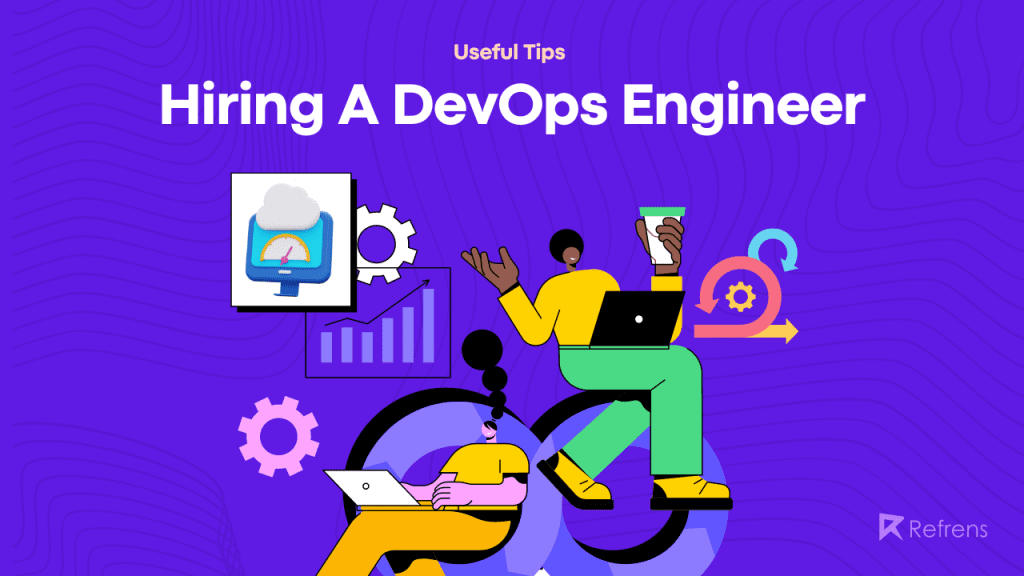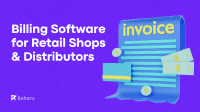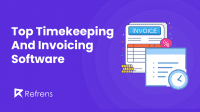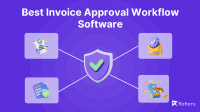In today’s fast-paced business world, software development is critical to the success of companies. In this scenario, hiring a DevOps freelancer can be a great way to get the technical expertise you need to manage your infrastructure and application development processes.
That being said, hiring developers can be challenging due to the specialized nature of their job and the difficulty in finding qualified candidates.
In this post, we discuss who are DevOps freelancers, why hiring freelancer is better than full-time employees, what you should consider when you hire them, and why you should choose Refrens to hire them.
Who Are DevOps Freelancers?
A DevOps freelance is a software engineer who works on a contract basis for different companies. They are responsible for automating the processes between software development and IT operations, which includes tasks such as building, testing, deploying, and monitoring software.
DevOps freelance engineers use a variety of tools and technologies to automate these processes, and they work closely with both development and operations teams to ensure that the software is delivered quickly and reliably.
DevOps freelance engineers are in high demand as businesses are increasingly looking to adopt DevOps practices to improve the speed, quality, and reliability of their software delivery. Their expertise often aligns with a DevOps modernization strategy, which aims to help organizations streamline and modernize the software development lifecycle for a competitive edge.
Why Hiring A Freelance DevOps Engineer Is The Right Choice In 2023?
Hiring a freelance DevOps engineer in 2023 can be the right choice for several reasons:
1. Flexibility
DevOps freelancers offer greater flexibility regarding working hours, project timelines, and project scope. They can work remotely, making working with a team across different time zones easier.
2. Cost-Effective
Hiring a freelancer is more cost-effective than hiring a full-time employee. With them, you only pay for the work they perform.
3. Specialized Skills
DevOps freelancers have the specialized skills and experience to handle the latest technologies and tools required to optimize the software development lifecycle.
According to a 2021 Statista survey, 59% of senior hiring managers in the United States said that their IT departments work with independent contractors due to their unique expertise. Similarly, the trend of engaging with nearshore software development in Latin America is on the rise, as it offers access to a vast pool of specialized talent coupled with the advantage of geographical proximity.
4. Quick Turnaround
Since they are not employees, you do not need to undergo lengthy onboarding and training processes. This can help speed up your project timelines.
5. Scalability
You can scale their services up or down based on your project need. You can find freelance developers on Refrens, Freelancer.com, Upwork, and Toptal. You can also approach recruitment agencies to find the appropriate candidate for your company.
6. Access to a wider pool of talent
When you hire a DevOps freelancer, you have access to a wider pool of talent than if you were limited to hiring full-time employees. This is because there are many talented DevOps engineers who prefer to work as freelancers.
8 Things To Check When You Hire A DevOps Freelancer

According to Upwork’s Future Workforce Report 2021, 53% of hiring managers are turning to skilled freelancers to cut costs, optimize efficiency, and enhance productivity in their organizations.
Furthermore, the report reveals that the demand for freelancers in the software development industry has grown exponentially.
However, when hiring a freelancer, especially a DevOps freelance, ensuring they have the right skills and experience to meet your needs is important. Here are 8 things to check before you hire them:
1. Technical Skills
A DevOps engineer requires a strong technical background to manage and automate the software development process.
They must possess the following technical skills:
- Experience with IaC tools
Experience with Terraform or CloudFormation to manage and automate infrastructure deployment.
- Understanding of Continuous Integration/Continuous Deployment (CI/CD)
An understanding of these principles and experience with CI/CD tools such as Jenkins, GitLab CI/CD, or CircleCI.
- Knowledge Of Containerization Tools
Having knowledge of such tools such as Docker, and container orchestration tools such as Kubernetes.
- Experience With Public Cloud Platforms
Some of the Public cloud platforms include Amazon Web Services (AWS), Microsoft Azure, or Google Cloud Platform (GCP)
- Understanding Of Configuration Management Tools
Examples of these tools include Ansible, Puppet, or Chef to manage server configurations.
- Proficiency in Scripting Languages
Some of these languages are Python and PowerShell, which are used to automate tasks and write scripts.
- Familiarity With Monitoring Tools
Examples of these tools include Prometheus, Grafana, or New Relic, and logging tools such as ELK Stack or Splunk
- Knowledge of Security Tools
Having knowledge of these tools and the best practices to implement security in the software development process
2. Expertise with Observability Tools
Observability is an essential aspect of DevOps, as it enables teams to monitor and gain insights into their systems and applications.
Developers should be familiar with the following observability tools:
- Monitoring Tools
Some examples of these are Prometheus, Grafana, Middleware, and Nagios. They help in monitoring system health, identifying issues, and ensuring the availability of applications
- Logging Tools
These include ELK stack, Splunk, Middleware, and Graylog. They are used to collect, analyze, and visualize logs to identify and troubleshoot issues
- Tracing Tools
Some examples of these include Jaeger, Zipkin, and OpenTelemetry. They can trace requests across distributed systems, enabling engineers to resolve performance issues
- Application Performance Monitoring (APM) tools
These include New Relic, Datadog, AppDynamics, and Middleware. They help monitor and optimize application performance
- Synthetic Monitoring tools
Some examples include Middleware, Pingdom, Uptrends, and BrowserStack. They help simulate user behavior and monitor application performance
- Error-Tracking Tools
These include Sentry, Raygun, and Bugsnag. They can help fix application errors
- Infrastructure Monitoring Tools
Some examples like Nagios, Middleware, Zabbix, and Datadog. They are used to monitor the performance and health of servers, network devices, and other infrastructure components
3. Past Project Experience
When hiring a freelance developer, don’t skip hiring a reference check service to verify their work history, portfolio, and client feedback to ensure you’re partnering with a skilled and reliable professional. A little due diligence upfront can save you from potential headaches down the road.
- Project Scope
Evaluate the project scope of past projects the engineer has worked on and find out if they were similar in size and complexity to your project.
Also, assess if they have experience with your technologies and tools. Also, consider whether the engineer has experience working in your industry, as this can give them a better understanding of your specific needs and challenges.
- Automation Experience
Determine the level of automation the engineer has implemented in past projects. Look for evidence of their ability to automate build, deployment, and testing processes using tools like Jenkins, TravisCI, and CircleCI
- Collaboration and Communication
Evaluate the engineer’s communication, collaboration, problem-solving, and troubleshooting skills.
Look for examples of how they have worked with developers, testers, and project managers to resolve system architecture issues to ensure smooth and efficient software development
- Agile Methodologies
Verify their familiarity with Agile methodologies like Scrum, Kanban, or Lean, and experience working in Agile environments
- Cloud Experience:
Determine their level of experience with public cloud platforms such as AWS, Azure, or GCP. Look for examples of how they have designed, implemented, and managed cloud-based infrastructure
4. Critical Thinking
DevOps are required to have sharp critical thinking skills, which include:
- Data And Pattern Analysis, and Solving Complex Problems
Related to infrastructure, automation, and software deployment
- Making Decisions
As these decisions must be taken after considering the impact on the project and the organization as a whole
- Adapting
To changing environments, and thinking creatively, leading to developing innovative solutions to complex problems
- Assessing Risks
Related to software deployment, security, and scalability, and implementing strategies to mitigate these risks
5. Working Independently
- Able to Work Independently
The freelancer must be able to work independently without any effort from the management team.
Check out how you can manage your time as a freelancer.
- Should Document Their Work Effectively
It is one of the most important skills to look out for in any DevOps freelancer. Documenting your tasks, deliverables, and work is vital because oftentimes, many more people are going to use the code that the freelancer wrote.
- Have A Passion for Continuous Learning
6. Soft Skills
DevOps must additionally possess soft skills, such as:
To work effectively with team members, stakeholders, and clients. They should be able to explain complex technical concepts clearly and concisely.
- Working Collaboratively
With team members from different backgrounds and expertise levels, sharing knowledge and ideas and providing support to other team members.
- Effective Time Management
DevOps freelancers must be able to prioritize tasks and meet project deadlines.
- Adaptidibility
To changing environments and technology trends and must be open to working with new ideas and emerging technologies.
7. Team Management Skills
Furthermore, they must display critical team management capabilities while working in a team environment.
- Providing Guidance
Mentorship and Support in the form of daily communication etc. to team members to ensure project success.
- Task Delegation
To ensure that team members have clear expectations and deadlines.
- Conflict Resolution
Making sure that team members can work together productively.
- Motivating Team Members
To create a positive work environment that encourages productivity, creativity, and innovation.
- Empathy
Understanding the needs of team members, their concerns, and challenges etc.
- Managing team performance
Providing feedback, and coaching wherever necessary.
8. Certifications
Certifications enable DevOps engineers to demonstrate their expertise and knowledge.
The following are some of the main certifications that companies must look for in a potential freelance developer as part of their devops roadmap:
- AWS Certified DevOps Engineer – Professional
This certification validates their skills in designing, deploying, and managing AWS environments using DevOps practices.
- Microsoft Certified: Azure DevOps Engineer Expert
This certifies their experience in designing, implementing, and managing Azure DevOps solutions. This Microsoft certification showcases their proficiency in using Azure DevOps tools effectively.
- Google Cloud Professional DevOps Engineer
This certification accredits a DevOps engineer’s abilities in designing and implementing DevOps solutions on Google Cloud.
- Kubernetes Certified Administrator
This recognizes their skills in managing Kubernetes clusters and deploying applications using Kubernetes.
- Certified Jenkins Engineer
This certification validates a DevOps engineer’s ability to design, implement, and manage Jenkins-based CI/CD pipelines.
- Red Hat Certified Engineer in DevOps
This recognizes DevOps’ skills in using Red Hat technologies to implement DevOps practices.
- DevOps Institute Certifications
The DevOps Institute offers several certifications, including the DevOps Foundation certification and the DevOps Leader certification, which validate a DevOps engineer’s knowledge and expertise in DevOps practices and culture.

Where To Find Your Next DevOps Freelancer?
There are many places to hire a DevOps freelancer, including:
- Freelance job boards: Many freelance job boards list DevOps freelancers. Some of the most popular freelance job boards include Upwork, Refrens, Fiverr, and Guru.
- Social media: There are many DevOps communities on social media where you can find freelancers. Some of the most popular DevOps communities include LinkedIn, Twitter, and Reddit.
- DevOps meetups: There are many DevOps meetups that you can attend to meet potential freelancers. You can find DevOps meetups in your area by searching online.
- Word-of-mouth: Ask your friends, colleagues, and other business contacts if they know any good DevOps freelancers.
When hiring a DevOps freelancer, it is important to do your research and make sure that you find someone who is qualified for the job. You should also be clear about your expectations and budget.
Also read: How to decide between hiring In-house vs freelancers or agency engagement>
Why Choose Refrens Over Any Other Platform For Hiring Freelancers?
Refrens is a trustworthy platform for hiring freelancers, offering distinct advantages over other platforms. With a stringent vetting process, Refrens ensures that only highly skilled professionals are accepted, guaranteeing top-quality freelancers.
Their diverse talent pool spans various industries, enabling you to find specialized professionals tailored to your project requirements.
Transparent reviews and ratings provide genuine feedback, aiding informed decision-making. Secure payments through an escrow system safeguard freelancers and clients alike.
Dedicated customer support is available for prompt assistance. Refrens also offers competitive pricing, acknowledging budget constraints while maintaining quality standards. Overall, Refrens is a reliable choice, excelling in quality assurance, diverse talent, transparency, secure payments, and dedicated support.
Wrapping Up
Once you have identified the necessary qualities and skills required for your candidate, finding the right freelancer should not be challenging.
However, since the work of software development itself is complex, you must establish a thorough and comprehensive hiring process that will enable you to zero in on the ideal consultant and ensure they possess all the necessary qualities.
Considering the above-mentioned factors, you can choose the right DevOps engineer to help ensure your infrastructure is reliable, scalable, and secure.
Recommended Reads: 15 Best Invoicing Software In 2024


















